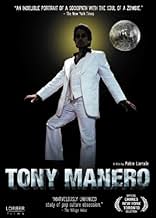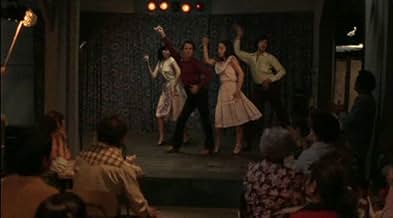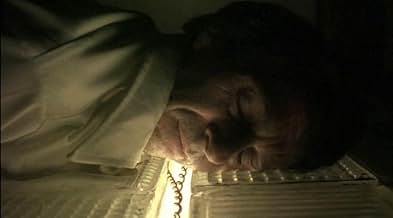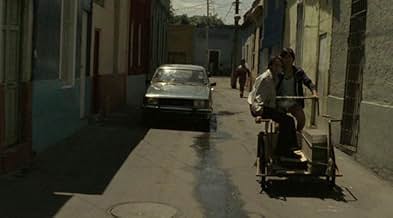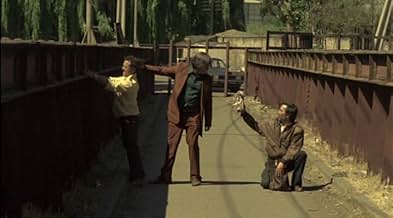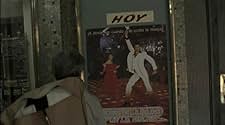ÉVALUATION IMDb
6,8/10
4,7 k
MA NOTE
Un homme est obsédé par le personnage de danseur disco de John Travolta de La Fièvre du samedi soir (1977).Un homme est obsédé par le personnage de danseur disco de John Travolta de La Fièvre du samedi soir (1977).Un homme est obsédé par le personnage de danseur disco de John Travolta de La Fièvre du samedi soir (1977).
- Director
- Writers
- Stars
- Prix
- 19 victoires et 16 nominations au total
Avis en vedette
Edging to the annual awards season, this year a sure thing is that Chilean director Pablo Larrín will on everybody's radar with his one-two punch NERUDA (Chile's entry for the Best Foreign Language Film) and the formidable JACKIE, a biopic about Jacqueline Kennedy, may win its star Natalie Portman a second Oscar statue as a major player.
So here comes a warm-up to get acquainted with Larrín's previous work, TONY MANERO is his second feature, a sombre take on Chile's darkest time under the Pinochet regime peppered by a less sombre through-line: the 52-year-old protagonist Raúl Peralta's (Castro, Larrín's regular, an Al Pacino doppelgänger both in appearance and affective intensity, also the co-writer of the script) obdurate participation of a TV program "One O'Clock Festival", where a Tony Manero (the lead character in John Badham's Saturday NIGHT FEVER 1977, played by John Travolta) impersonation competition is scheduled in Santiago, 1978.
Examined closely by a hand-held Super 16mm, which intermittently toys with a blurry focus to accentuate the proximity of a sordid milieu, Raúl gives us the first impression of a pallid, taciturn, hangdog loner in the opening scenes where he mistakes the registration date as the actual contest, which will be held one week later. But that facet loses its disguise quickly, when he schematically assaults an old woman who has just been mugged on the street, at her own home, to take away her small boxy color TV set. He is not so much a petty criminal as a ruthless homicide, which ingeniously puts audience at the edge of the seat with a dreadful perturbation whenever he prowls or idles in the dilapidated environs, as violence could be erupted any moment if he sees the opportunity for a monetary gain, whoever the prey is.
Raúl lives with a coterie of amateur dancers in the scruffy house of Wilma (Poblete), where they also occasionally perform to entertain customers. His troupe includes Cony (Noguera), his friend- with-benefit, her adolescent daughter Pauli (Lattus) and Pauli's boyfriend Goyo (Morales). Together they help Raúl to rehearse the John Travola routine, but there is seething tension underneath, Raúl becomes impotent during an overtly explicit rumpy-pumpy, and is mocked by Cony that the only thing can revitalize him is the urge to win the competition, which sours their relationship, Goyo is involved with some surreptitious anti-Pinochet movement, which will put everyone under the interrogation of Pinochet's plainclothes secret police, although Raúl manages to skulk out since it is his big day.
Larrín's tack doesn't shy away from being obstinately provocative, up to an instance of sickeningly scatological malevolence, which seems like an unwarranted feeler to validate its sky's-the-limit artsy taste. But on the other hand, Larrín and his co-writers perspicuously cast a phenomenon of American culture invasion as an escapism for the amoral and the hard-up living under the terror of an autocracy, which indisputably hits the mark of liberating its restrained but astringent political manifesto.
Alfredo Castro is absolutely electrifying to watch from A to Z in the central role, holding Raúl's interior thoughts at bay, but excellently transforms himself onto the screen as a ravishingly volatile monster, with no fear, no conscience, no hold-up can stop his destructive/self-destructive wantonness (as the inauspicious ending dauntingly beckons), who should be answer for this type of societal mutator? The culprit is clear as day in this slam-bang critique of a bygone era weighing heavily on Larrín's fatherland.
So here comes a warm-up to get acquainted with Larrín's previous work, TONY MANERO is his second feature, a sombre take on Chile's darkest time under the Pinochet regime peppered by a less sombre through-line: the 52-year-old protagonist Raúl Peralta's (Castro, Larrín's regular, an Al Pacino doppelgänger both in appearance and affective intensity, also the co-writer of the script) obdurate participation of a TV program "One O'Clock Festival", where a Tony Manero (the lead character in John Badham's Saturday NIGHT FEVER 1977, played by John Travolta) impersonation competition is scheduled in Santiago, 1978.
Examined closely by a hand-held Super 16mm, which intermittently toys with a blurry focus to accentuate the proximity of a sordid milieu, Raúl gives us the first impression of a pallid, taciturn, hangdog loner in the opening scenes where he mistakes the registration date as the actual contest, which will be held one week later. But that facet loses its disguise quickly, when he schematically assaults an old woman who has just been mugged on the street, at her own home, to take away her small boxy color TV set. He is not so much a petty criminal as a ruthless homicide, which ingeniously puts audience at the edge of the seat with a dreadful perturbation whenever he prowls or idles in the dilapidated environs, as violence could be erupted any moment if he sees the opportunity for a monetary gain, whoever the prey is.
Raúl lives with a coterie of amateur dancers in the scruffy house of Wilma (Poblete), where they also occasionally perform to entertain customers. His troupe includes Cony (Noguera), his friend- with-benefit, her adolescent daughter Pauli (Lattus) and Pauli's boyfriend Goyo (Morales). Together they help Raúl to rehearse the John Travola routine, but there is seething tension underneath, Raúl becomes impotent during an overtly explicit rumpy-pumpy, and is mocked by Cony that the only thing can revitalize him is the urge to win the competition, which sours their relationship, Goyo is involved with some surreptitious anti-Pinochet movement, which will put everyone under the interrogation of Pinochet's plainclothes secret police, although Raúl manages to skulk out since it is his big day.
Larrín's tack doesn't shy away from being obstinately provocative, up to an instance of sickeningly scatological malevolence, which seems like an unwarranted feeler to validate its sky's-the-limit artsy taste. But on the other hand, Larrín and his co-writers perspicuously cast a phenomenon of American culture invasion as an escapism for the amoral and the hard-up living under the terror of an autocracy, which indisputably hits the mark of liberating its restrained but astringent political manifesto.
Alfredo Castro is absolutely electrifying to watch from A to Z in the central role, holding Raúl's interior thoughts at bay, but excellently transforms himself onto the screen as a ravishingly volatile monster, with no fear, no conscience, no hold-up can stop his destructive/self-destructive wantonness (as the inauspicious ending dauntingly beckons), who should be answer for this type of societal mutator? The culprit is clear as day in this slam-bang critique of a bygone era weighing heavily on Larrín's fatherland.
THis film sneaks up on you - there is something unsettling and powerful about it. The lead performance is raw, real and sad. This guy is a low street thief who has a circle of whores and other lowlifes around him. It doesn't matter if you know a bit about the horrible regime of General Pinochet who was in power when the film is set - 1978 but the movie is a metaphor for this brutal dictator's control of the country - insane behavior creating insane results. The lead guy is obsessed with Travolta's film Saturday Night Fever - he watches it in a movie theatre endlessly - memorizing the dialogue and all of Travolta's moves and dance steps. A Chile TV Variety show has celebrity look-a-like contests and he was to enter and win the Tony Manero contest - white suit and all. This movie feels like a documentary - and there are moments of calm followed by shocking displays of violence. I can see that this film might not be for everyone but I found it to be incredibly powerful. I disagree with the summary on this page though that describes the guy as a "serial killer" - he is not a serial killer - he just makes sure to get anyone out the way who stands between him and his obsession.
If the name Tony Manero means anything to anyone at all, then it will be because of a rather famous breakthrough role on behalf of a certain American actor named John Travolta, whose performance as said character in 1977's Saturday Night Fever saw him propelled into the acting limelight as this fascinating negotiator of the dance floor and charismatic presence when dialogue and exchange was required. With the release of this, a hard boiled Chilean drama directed by a certain Pablo Larraín and arriving with it the title of Tony Manero, the name threatens to take on a new found sense of identity or initial 'link' with audiences; much like the musical number "Singing in the Rain" may have done with some once Kubrick got his hands on it. Very few films that I can recall have had the ability to have you symptomatically tapping your feet at a catchy tune accompanying the somewhat elated feeling brought about by the grace of an on screen dance performance, whilst forcing you to watch proceedings through the spindly cracks that formulate out of having all of your fingers pressed together due to not really being able to watch. This Chilean film about idolisation and the impact of Western culture on foreign lands is one of them; a fascinating, a positively nihilist, take on the daring to dream whilst under a proverbial strain and is a shattering experience.
For the most part, the film plays out like this really stripped down; really rather grotty look at poor Chileans living under the tyranny of the then Pinochet-led government of the early 1980s, that just so happens to encompass a bi-polar man who's on the cusp of psychopathy and has an obsession for Travolta's aforementioned character. At the core of it is lead Raúl Peralta (Castro); a man operating within certain circles encompassing family members and contacts down at the oft-frequented local dancing club, but a man with a dangerous obsession of both the titular character of years gone by and the film from whence he comes. Peralta cuts a worn, ominous figure; a man with the mannerisms and understated sense of both threat and anger to that of Travis Bickle, an accent with a chiselled complexion plus general sense of menace to that of Pacino's Scarface anti-hero lead Tony Montana. A peek into his mind reveals the uncontrollable desire to lash out at those unsuspecting and vulnerable, the beating to death of an elderly woman, whose company he briefly shares whilst in her home, giving way to an unfathomable sense of anguish seeing him eventually take measures to make sure that her now orphaned pet cat will not remain alone and therefore starve.
Peralta's dream is to dance professionally, this unfriendly; sleazy; whore dwelling lowlife whom, at one point, loots the body of a dead man because it benefits him, desires to branch off and find success within a practice often attributed with characteristics of prouesse, elegance and splendor. Thinking he's ready for the challenge, we observe him in the opening scenes attend a televised dance competition at a studio which sees him not only turn up on the incorrect date alluding to more dangerous issues there, but completely go against rules and regulation that are established upon his arrival by heading on in and snooping around anyway, thus paying sly hint to his inability to see things any other which way but normally.
Peralta's sometimes ventures to the cinema, a local picture house showing that of John Badham's then relatively recent Saturday Night Fever to sparse audiences complete with subtitles. He breezes into the various showings at whatever time he wishes; usually just in time to catch one of the many disco-set scenes thus creating the illusion of actually walking into a disco proper ready to strut one's moves thus nicely syncing up with that of the on screen characters. A scholar of the film, Peralta is able to quote large chunks of dialogue in a stone faced and mechanical fashion; sitting there acting out the passages of play filling in for Travolta's dialogue and getting caught up in a film all about the distinction between characters both inside and outside of the dance hall, much in the same way Tony Manero goes on to explore its own lead's predicament both within his fantasy of wanting to dance and playing Travolta's part, as well as that of his true to life surroundings.
The film pays homage to that notion of Travolta's very specific character from that very specific 1977 film being such a mover and such the focal point he was; Manero was a man at the centre of everybody's diegetic attention, an attention which matched up with that of the audience's, somebody whom the camera went out of its way to embrace or to incorporate whilst they danced to imbue proceedings with a sense of objectification. Peralta's gradual obsession with Manero might be read into as being born out of this, his utilisation of dance as a means of escaping the dishevelled living conditions he inhabits going in perfect tandem with that of Manero's own use of the dance hall as a place he can become somebody else; the injustice which later befalls him an injustice essentially something born out of the lack of democratic procedure in regards to voting, something reflective in the real Chile where politics and freedom and such do not link up so easily. The film's chugs through to a disturbing final shot, a composition hinting at Peralta's now newfound sense of coming to terms with the nature of his world of escape merely an extension of the unfair reality he sought to get away from; on the other hand, a shot alluding as much to a man already beneath the line of sanity so much so that he really doesn't care either way. Larraín's hard hitting drama makes for fantastic watching; the results of which are some morbid, gripping viewing.
For the most part, the film plays out like this really stripped down; really rather grotty look at poor Chileans living under the tyranny of the then Pinochet-led government of the early 1980s, that just so happens to encompass a bi-polar man who's on the cusp of psychopathy and has an obsession for Travolta's aforementioned character. At the core of it is lead Raúl Peralta (Castro); a man operating within certain circles encompassing family members and contacts down at the oft-frequented local dancing club, but a man with a dangerous obsession of both the titular character of years gone by and the film from whence he comes. Peralta cuts a worn, ominous figure; a man with the mannerisms and understated sense of both threat and anger to that of Travis Bickle, an accent with a chiselled complexion plus general sense of menace to that of Pacino's Scarface anti-hero lead Tony Montana. A peek into his mind reveals the uncontrollable desire to lash out at those unsuspecting and vulnerable, the beating to death of an elderly woman, whose company he briefly shares whilst in her home, giving way to an unfathomable sense of anguish seeing him eventually take measures to make sure that her now orphaned pet cat will not remain alone and therefore starve.
Peralta's dream is to dance professionally, this unfriendly; sleazy; whore dwelling lowlife whom, at one point, loots the body of a dead man because it benefits him, desires to branch off and find success within a practice often attributed with characteristics of prouesse, elegance and splendor. Thinking he's ready for the challenge, we observe him in the opening scenes attend a televised dance competition at a studio which sees him not only turn up on the incorrect date alluding to more dangerous issues there, but completely go against rules and regulation that are established upon his arrival by heading on in and snooping around anyway, thus paying sly hint to his inability to see things any other which way but normally.
Peralta's sometimes ventures to the cinema, a local picture house showing that of John Badham's then relatively recent Saturday Night Fever to sparse audiences complete with subtitles. He breezes into the various showings at whatever time he wishes; usually just in time to catch one of the many disco-set scenes thus creating the illusion of actually walking into a disco proper ready to strut one's moves thus nicely syncing up with that of the on screen characters. A scholar of the film, Peralta is able to quote large chunks of dialogue in a stone faced and mechanical fashion; sitting there acting out the passages of play filling in for Travolta's dialogue and getting caught up in a film all about the distinction between characters both inside and outside of the dance hall, much in the same way Tony Manero goes on to explore its own lead's predicament both within his fantasy of wanting to dance and playing Travolta's part, as well as that of his true to life surroundings.
The film pays homage to that notion of Travolta's very specific character from that very specific 1977 film being such a mover and such the focal point he was; Manero was a man at the centre of everybody's diegetic attention, an attention which matched up with that of the audience's, somebody whom the camera went out of its way to embrace or to incorporate whilst they danced to imbue proceedings with a sense of objectification. Peralta's gradual obsession with Manero might be read into as being born out of this, his utilisation of dance as a means of escaping the dishevelled living conditions he inhabits going in perfect tandem with that of Manero's own use of the dance hall as a place he can become somebody else; the injustice which later befalls him an injustice essentially something born out of the lack of democratic procedure in regards to voting, something reflective in the real Chile where politics and freedom and such do not link up so easily. The film's chugs through to a disturbing final shot, a composition hinting at Peralta's now newfound sense of coming to terms with the nature of his world of escape merely an extension of the unfair reality he sought to get away from; on the other hand, a shot alluding as much to a man already beneath the line of sanity so much so that he really doesn't care either way. Larraín's hard hitting drama makes for fantastic watching; the results of which are some morbid, gripping viewing.
In the midst of the social context of the Pinochet dictatorship, Raúl Peralta, a man in his 50s, is obsessed with the idea of impersonating Tony Manero, John Travolta's character in the movie "Saturday Night Fever". Raúl leads a small group of dancers, who regularly perform at a bar on the outskirts. Every Saturday night, he unleashes his passion for movie songs by imitating his idol. His dream of being recognized as a successful showbiz star is about to come true when the national TV station announces a Tony Manero impersonator contest. His anxiety to reproduce the idol leads him to commit a series of crimes and thefts.
It is an extremely ambiguous film, at the same time that we feel sorry for the protagonist in the first ten minutes we feel the incredible that pulsates and disgust for its violent and obsessive data, bordering on the sick... A very interesting film with a differentiated approach, obsession for a idol, the dream of pursuing a profession and aggression taking on realistic contours...
It is an extremely ambiguous film, at the same time that we feel sorry for the protagonist in the first ten minutes we feel the incredible that pulsates and disgust for its violent and obsessive data, bordering on the sick... A very interesting film with a differentiated approach, obsession for a idol, the dream of pursuing a profession and aggression taking on realistic contours...
TONY MANERO (dir. Pablo Larraín) The film is set in Chile during the fascist reign of Augusto Pinochet, and focuses on a man who is obsessed with John Travolta's discotheque super-star character in Saturday NIGHT FEVER. This might have been played for laughs, but Pablo Larrain's film is an evil fantasy of disco glory that portrays an obsessive and twisted character who is willing to kill to to fulfill his grotesque vision of acclaim. The frenzied violence in this film is so sudden and inexplicable that it literally takes your breath away. The film seems to present a subtle metaphor that compares the highly stylized nature of disco to the uncompromising fascist posturing of totalitarianism. ABSOLUTE MUST SEE
Le saviez-vous
- AnecdotesSome clips and tunes from both La fièvre du samedi soir (1977) and Brillantine (1978) appear in this film, the most prominent song heard is The Bee Gees' "You Should Be Dancing" from Saturday Night Fever. The final credits acknowledge Paramount Pictures for use of both films in this picture.
- GaffesThe "Members Only" jacket worn by Raul wasn't introduced until 1981, and the film takes place in 1978.
- Citations
Title Card: [first lines]
Don Enrique: [subtitled version] And now we present our look-alike contest: 'The One O'clock Festival'
Security Guard: Wait here, please.
- ConnexionsFeatured in Sin maquillaje: Alfredo Castro (2011)
Meilleurs choix
Connectez-vous pour évaluer et surveiller les recommandations personnalisées
- How long is Tony Manero?Propulsé par Alexa
Détails
Box-office
- Brut – États-Unis et Canada
- 20 677 $ US
- Fin de semaine d'ouverture – États-Unis et Canada
- 3 305 $ US
- 5 juill. 2009
- Brut – à l'échelle mondiale
- 687 406 $ US
- Durée1 heure 37 minutes
- Couleur
- Mixage
- Rapport de forme
- 1.85 : 1
Contribuer à cette page
Suggérer une modification ou ajouter du contenu manquant

Lacune principale
By what name was Tony Manero (2008) officially released in Canada in English?
Répondre

